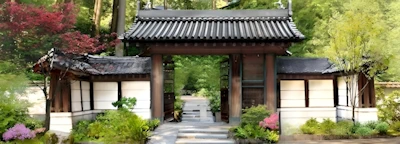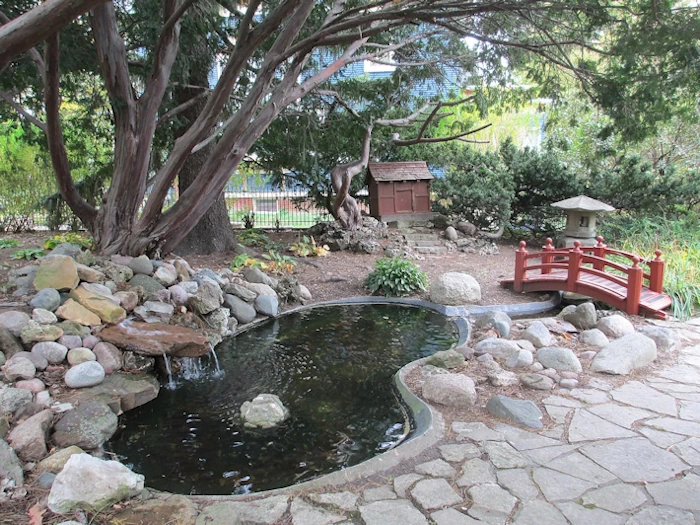Muscatine Art Center Japanese Garden (Est. 1930)
Event Location
Muscatine, IA 52761
The Muscatine Art Center Japanese Garden, located in Muscatine, Iowa, is a tranquil and culturally significant oasis that offers visitors a serene escape from the bustle of daily life. Established in 1967, this garden is notable for being one of the earliest Japanese-style gardens in the United States, a testament to the enduring influence of Japanese aesthetics and horticultural techniques on American landscapes.
This beautiful garden comprises a harmonious blend of traditional Japanese design elements and local flora, creating a unique and peaceful atmosphere. It features a koi pond with gracefully arched bridges, meandering stone pathways, meticulously pruned trees, and carefully placed rocks. The garden is a testament to the Japanese philosophy of creating a microcosm of nature, with an emphasis on balance, harmony, and simplicity.
Historic Japanese Garden
One of the most distinctive features of the Muscatine Art Center Japanese Garden is its collection of Japanese plants, including exquisite cherry blossoms, Japanese maples, and various species of ornamental trees and shrubs. These plants are meticulously maintained to reflect the changing seasons and create a dynamic visual experience throughout the year. Additionally, stone lanterns, a teahouse, and other decorative elements add to the garden's authentic ambiance.
The garden's design encourages contemplation and mindfulness, making it a perfect place for relaxation, meditation, or simply enjoying the beauty of nature. Its establishment in the 1960s was a pioneering effort, bringing Japanese gardening traditions to the heart of the American Midwest, and it remains a cherished cultural and horticultural landmark to this day. The Muscatine Art Center Japanese Garden is a living testament to the enduring appeal and timelessness of Japanese garden design, offering visitors a unique glimpse into a serene and captivating world of beauty and harmony.
Certainly, here is a list of common features found in Japanese Gardens
• Koi Pond: Often a central element, koi ponds are home to colorful carp and contribute to the serene atmosphere.
• Bridges: Arched or flat bridges made of wood or stone, such as arched red bridges (taiko-bashi), add both practicality and aesthetics.
• Stone Pathways: Meandering stone or gravel pathways lead visitors through the garden and encourage contemplation.
• Bamboo: Bamboo groves, fences, or water features are frequently used for their natural beauty and symbolism.
• Teahouse: A traditional teahouse provides a space for tea ceremonies and a view of the garden.
• Lanterns: Stone lanterns, including tōrō and ishi-dōrō, add an authentic touch and often serve as focal points.
• Rock Arrangements: Carefully placed rocks and boulders, known as ishi, symbolize mountains and waterfalls.
• Pruned Trees and Shrubs: Japanese gardens showcase meticulously trimmed trees, like Japanese maples, pine, and cherry blossoms, and neatly clipped shrubs.
• Zen Garden: A dry garden, or karesansui, may feature raked gravel, sand, or small stones, often with rocks or boulders, and represents abstract landscapes.
• Tsukubai: A stone basin and water arrangement for ritual purification, typically found near the entrance or teahouse.
• Moss and Ground Cover: Moss and other low-growing plants cover the ground, adding texture and beauty.
• Bonsai Trees: Miniature trees are often placed on display, showcasing the art of bonsai cultivation.
• Water Features: Streams, waterfalls, and other water elements provide both visual and auditory interest.
• Fences and Gates: Wooden or bamboo fences, along with traditional gates like torii, demarcate garden
areas.
• Statues and Ornaments: Decorative elements such as Buddha statues, pagodas, and shishi (guardian lions) can be incorporated.
These elements are thoughtfully combined to create a harmonious and contemplative environment that reflects Japanese aesthetics and philosophy in garden design.
The historic Japanese Garden is currently being rehabilitated.
The target completion date is September 30, 2023.
This grant-funded project follows the recommendations from the Historic Landscape Preservation Plan and will return historic character defining features to the garden. Access to the garden will be restricted for much of 2022 and into late summer 2023. The Muscatine Art Center was awarded a competitive grant from the Paul Bruhn Historic Preservation Program, a federal grant fund administered in Iowa through the Iowa Department of Cultural Affairs. The Roy J. Carver Charitable Trust awarded a grant to complete the funding need for this project.
Authentic Japanese Gardens (United States)
Best Japanese Gardens
Japanese Rock 'Zen' Gardens (United States)
Best Japanese Rock 'Zen' Gardens
Japanese Teahouses (United States)
Best Japanese Teahouses
Japanese Museum Art
Japanese Museums Map of Japanese Museums

















